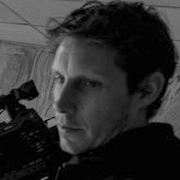
Jacob Bryant
When profiles are prepared for NZ On Screen, corresponding with busy industry figures can sometimes be a lengthy process. But Jacob Bryant’s reply tops the list of explanations for delayed replies:
"Thanks for your email. I'm currently on a photographic and doc assignment heading by sea to Gaza. The flotilla is hoping to break the blockade but I'm expecting, after what is expected to be a violent boarding of the boats, that I will be in Israeli custody from some time in the coming days..."
Bryant was later imprisoned, then deported (with a swallowed camera memory card inside his stomach). Being waylaid by a blockade is not an exceptional experience for him: Bryant has forged a reputation as an intrepid cinematographer, filming assignments in Iraq, Sudan, Zimbabwe, Afghanistan and beyond.
Bryant grew up in Le Bons Bay, Banks Peninsula. He left school at 14 and took up apprenticeships in jewellery, then photolithography. In early 2001, disillusioned with corporate work in London for BP, he purchased a Super 8 camera from Portobello Markets, igniting an obsession with filming.
He got his break when a friend was making a no-budget environmental documentary. Bryant crammed up on camera basics, and made a list of "the things I HAD to get right to not f**k it up … I realised through my apprenticeships that the aesthetic would come, but it was immediately more important to get the mechanics second nature."
Mentored by expat director of photography Roger Laxon, Bryant working on stories for the BBC, CNN, TWI and Insight during three years based in London. Since returning to New Zealand, the far-flung assignments have continued.
En route he has established a productive collaboration with director Pietra Brettkelly, shooting for Sundance award-winning documentary Art Star and Sudanese Twins, Māori Boy Genius, and extreme jobs series Ends of the Earth. Work on the latter earned Bryant a 2007 Qantas Award, for an episode shot in Afghanistan. A Flickering Truth (2015) — about the endurance of an Afghanistan film archive — won praise after screenings at the Venice and Toronto film festivals.
Bryant has also twice teamed with veteran doco director Annie Goldson: on Brother Number One (Olympic rower Rob Hamill’s search for justice for the murder of his brother by Khmer Rouge), and He Toki Huna (in which Hit and Run author Jon Stephenson questions New Zealand’s decade-long involvement in Afghanistan). Bryant and Stephenson also worked together on 'Collateral Damage', an acclaimed 2014 report for TV's Native Affairs. In a remote Afghanistan teahouse they interviewed victims of raids by Allied forces (including the NZ SAS).
"It just amazes me how gracious and honourable these people are and the lack of justice or accountability for them and their families. It wasn’t until the end [of the interview] that we realised one of the four men had his leg missing from the raid, and all the others were still suffering pain and scars from US shrapnel that came at them from a helicopter gun-ship in the middle of the night..."
"The smallest thing can fester into life-threatening events . . . I have seen people pull guns on each other over minor car accidents in Kabul. Things can get out of control very quickly as people are on an emotional knife edge."
Given Bryant’s experience in volatile situations, he was an apt choice to accompany Robyn Paterson on a mission back to Zimbabwe to find a childhood friend. Finding Mercy (2012) involved hiding cameras while negotiating the apparatus of Robert Mugabe’s regime. It scored Bryant and Marty Williams a Best Cinematography award at the 2013 Documentary Edge Festival.
On the small screen, presenter Marcus Lush has often been in Bryant’s lens, including popular TV showes Off the Rails, North, and Antarctic chronicle ICE . Bryant has also shot many Intrepid Journeys, sex offenders and poisoned sawmill workers, and framed subjects ranging from whales and eco-living to euthanasia and evolution in the South Pacific (Planet Earth, for the BBC). He has ranged from comedy series Super City to a broken city (Christchurch quake doco When a City Falls). In 2008 he even filmed one of his own: legendary cinematographer Alun Bollinger for Qantas-nominated Gerard Smyth doco Barefoot Cinema.
In 2017 he was nominated in New Zealand's Moa Film Awards for both Richie McCaw documentary Chasing Great and A Flickering Truth. Further cinematography nominations have followed, thanks to David Farrier show Dark Tourist and 2021 documentary The Garden of Evil.
Bryant is reticent to reflect on especially challenging moments. "I know I’m avoiding having to tell 'war stories' but my experiences pale in comparison to many of those I have had the privilege to spend time with. I’m especially proud of the work I have done in Afghanistan for the simple reason those stories have shed a light on peoples lives who would otherwise have gone unnoticed."
In Bryant’s work ethic, gongs or aesthetic achievements are secondary: "You know, it’s extremely important for me that the work has positive effects on those I work with, it’s far more important than the photographic process itself."
Profile updated on 20 October 2023
Sources include
Jacob Bryant
Gemma Gracewood, 'Documentary Edge Festival' (Review of Finding Mercy) — Metro, April 2013
'Jacob Bryant'. Internet Movie Database website. Accessed 12 May 2017
'Native Affairs - Collateral Damage' (Television Documentary) Reporter Jon Stephenson (Māori Television, 2014)